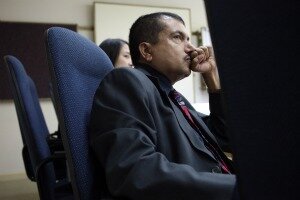Want to bargain? The Nepalis can help
 The art of being a good negotiator is something many crave. For those in Health Ministries, good negotiators can earn better terms in health projects as well as millions of dollars beyond the initial offer, translating into better health care treatment for the population and lives saved.
The art of being a good negotiator is something many crave. For those in Health Ministries, good negotiators can earn better terms in health projects as well as millions of dollars beyond the initial offer, translating into better health care treatment for the population and lives saved.
A team of Nepali health officials told the MLI Learning Collaborative Forum today in Addis Ababa, Ethiopia, that a series of training in negotiations has resulted in measurable differences.
The training "has already helped senior leaders in Nepal to be better negotiators for the people in Nepal," said Khadka Bahadur Basyal Sarki, State Minister of the Ministry of Health and Population.
Kabiraj Khanal, Under Secretary at Nepal's
Ministry of Health and Population
Three negotiations sessions – coordinated and funded by MLI and run by CMPartners in Cambridge, MA – taught the participants that negotiations are "nothing magical," said Gabriele Mallapaty, MLI country lead in Nepal. "Everyone is negotiating everyday. Everyone in this room is a negotiator…But you need to break down the negotiation process in pieces to help us be better at negotiating."
Those pieces include research and good communication among parties prior to negotiations, exploring possible options and alternatives, knowing an end result, and understanding the other negotiators’ point of view.
Kabiraj Khanal, Under Secretary at the Ministry, told the group it was important to "generate options. There may be many, many outcomes, not just one outcome. You have to generate options on your side and the other side. How do we find out different options? You have to ask questions."
Khanal presented a case study based on negotiations in February between the Ministry and the World Bank. Among the issues: The World Bank was offering a $115 million, five-year package that included a loan and grant to support Nepal’s Second National Health Sector Programme.
Over two days at the World Bank office in Kathmandu, he told the representatives of four Ministries in developing countries, the World Bank wanted to earmark some money for HIV/AIDS programs, strengthen the oversight of the funding, and improve its procurement services. The Ministry wanted a larger financial package and no separate funding for HIV/AIDS.
Khanal asked the group: "You are a senior person in your office. If you want to share something with your junior colleague about negotiation, about what you have to do, or not to do, what are you going to say? What would be your advice to your colleague?"
The responses came quickly.
Amara Koroma of Sierra Leone: "I would tell them you should be a very good listener. You don’t interrupt. You try to understand what the other party is saying."
Issa Berthe of Mali: "You must know what the other team’s strategies are based upon. Every negotiator has an agenda."
Aminata Kanu of Sierra Leone: "I would ask, 'Were you at the MLI training for negotiations in the ministry?' If no, we’ll find someone else."
Rahel Gizaw of Ethiopia: "When you negotiate, it’s better to start with a shared interest, and use leverage from that."
Marty Makinen of Results for Development Institute in Washington, D.C.: "Understand the power relationship. If you have more power, use it only as a last resort."
Khanal applauded the advice. "You are so good at negotiating already. You don’t need any negotiating training any more!" But he did add, "You have to practice your skills, sometimes with role playing, as with practice you can improve a lot."
So what ever happened in the World Bank-Nepal negotiations?
Both sides got something. The World Bank secured agreement with Nepal for more oversight of funds. And Nepal got the money in one pot, plus a lot more money -- $129 million, a $14 million increase.
See video of the session below:
Live-blog from Ethiopia:
Part 1: MLI Live-blog from Addis Ababa
Part 2: ‘Its Always Good to Think Big’
Part 3: Mali’s Path to Community Health Insurance
Part 4: ‘A New Dawn’ in Health Care in Sierra Leone
Part 6: From Mali to Nepal: The Trail of a Negotiator
Part 7: Ethiopia’s New Plan: ‘It’s going to Really Improve this Place’
Part 8: Ethiopia and the Importance of Family Planning
Part 9: Gang of Four: Table Talk with Reproductive Health Directors
Part 10: Ethiopia’s Tedros: Four Steps to Owning Health Programs
Forum Wrap-up, Part 1: Marty Makinen and Amanda Folsom
Forum Wrap-up, Part 2: Rosann Wisman
Photo Credit Dominic Chavez
Keyword Search
MLI works with ministries of health to advance country ownership and leadership. This blog covers issues affecting the ministries and the people they serve.
Connect with Us
![]()
![]()
Categories
Blogs We Like
- Africa Can End Poverty
- Africa Governance Initiative
- Behind the Numbers
- CapacityPlus
- Center for Global Health R&D Policy Assessment
- Center for Global Development: Global Health Policy
- Center for Health Market Innovations
- Global Health
- Global Health Hub
- Global Health Impact
- The New Security Beat
- PAI Blog
- RH Reality Check
- Save the Children
- Transparency and Accountability Program
Contact Us
Please direct all inquiries to
